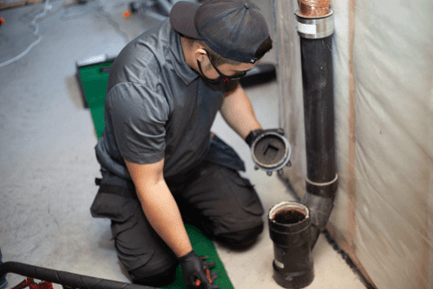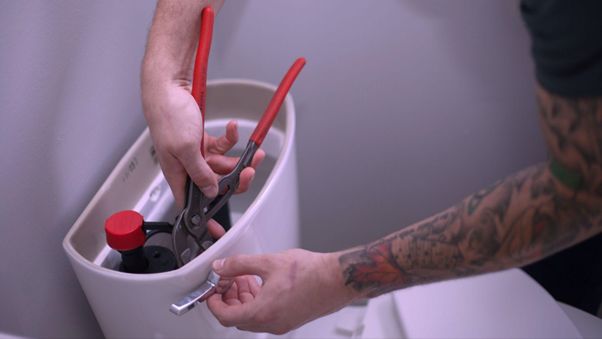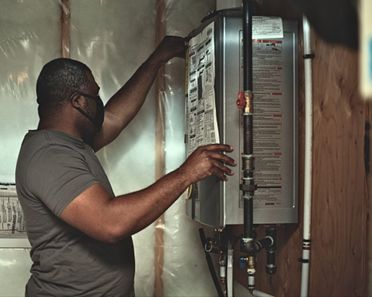Understanding One of The Less Thought-of Functions of Your Home
As a homeowner, understanding the basics of plumbing can save you time, money, and frustration. From leaky faucets to clogged drains, having some essential plumbing knowledge empowers you to tackle minor issues on your own and make informed decisions when it’s time to call in a plumber. In this article, we will share 10 essential plumbing tips that every homeowner should know. So, let’s dive in!
Know Your Water Main
Water is the lifeblood of your plumbing system, and knowing how to shut off the water main can save you from disaster. Familiarise yourself with the location of the main shut-off valve in your home. In case of emergencies, like a burst pipe, promptly turning off the water main can prevent extensive damage.
How Can I Find My Water Main?
To quickly find the location of your water main shutoff valve, start by checking the perimeter of your home. Look for a round or rectangular metal cover at ground level, usually near the front exterior wall.
If you have a basement or crawl space, the valve is often near the front foundation wall where the main water line enters your home. In utility rooms or garages, look for a valve near the water heater or along the wall where the main water line enters the house. If you’re still unsure, consult your home inspection report or contact a professional plumber for assistance.
Keep an Eye on Water Pressure
Proper water pressure ensures efficient functioning of your fixtures and reduces strain on pipes. Monitor your water pressure regularly to ensure it falls within the recommended range of 40 to 60 psi. High pressure can lead to leaks, while low pressure can indicate underlying plumbing issues.
How You Can Monitor Water Pressure In Your Home
In order to keep an eye on your water pressure, you can purchase a pressure gauge from a hardware store or online retailer. Attach the gauge to an outdoor faucet and connect it directly to your main water supply.
Simply screw the gauge onto the faucet tightly, ensuring a secure connection. When you turn on the faucet, the gauge will display the current water pressure. Keep an eye on the gauge periodically to ensure it falls within the recommended range of 40 to 60 psi.
Monitoring your water pressure allows you to detect any sudden changes that may indicate underlying plumbing issues and take appropriate action.
Practise Preventive Maintenance

Prevention is better than a flooded basement. Regularly inspect your plumbing system for any signs of leaks, corrosion, or damage. Addressing small issues promptly can prevent them from becoming major headaches down the line.
Practising good drain cleaning procedures can also prolong the life of your plumbing system, while also giving you the peace of mind knowing that your drains are constantly running smoothly.
How To Clean Your Own Drains
Regularly cleaning your drains can remove built-up debris, grease, and other substances that can cause blockages over time. There are several methods you can use for drain cleaning, such as using a plunger, pouring hot water down the drain, or using a mixture of baking soda and vinegar.
Additionally, using drain strainers and being mindful of what goes down your drains can help prevent clogs from forming in the first place, which is why it is always best practice to:
Be Mindful of What Goes Down the Drain!
Your drains aren’t a magical abyss. Certain objects can clog your drains at an alarming rate and can lead to clogs or cause damage to your pipes.Being mindful of what goes down the drain is crucial for maintaining a healthy plumbing system.
What Should I Avoid Putting Down My Drains?
It’s important to remember that drains are not magical disposal units but have limitations. Avoid pouring grease, oils, coffee grounds, and other non-flushable items down your drains.
These substances can accumulate, solidify, and lead to clogs and blockages in your pipes over time. Instead, dispose of cooking oil in a separate container and discard it properly. Use a sink strainer to catch food scraps and prevent them from going down the drain.
By being conscious of what goes down the drain, you can help prevent costly plumbing issues and ensure the efficient functioning of your plumbing system for years to come.
Learn to Fix a Leaky Faucet
A dripping faucet is money going down the drain. Fixing a leaky faucet is relatively simple and can save you gallons of water. Replace worn-out washers or cartridges to restore your faucet’s functionality and conserve water.
How To Stop A Leaking Faucet
Fixing a leaky faucet is a relatively simple task that can save you water and frustration. Start by turning off the water supply to the faucet by closing the shutoff valves under the sink. Next, remove the handle and the decorative cap, if applicable, to access the valve.
Use an adjustable wrench or pliers to loosen and remove the valve assembly. Check for any worn-out washers or O-rings and replace them with new ones. Reassemble the faucet, turn on the water supply, and test for leaks.
If the leak persists, it may be necessary to replace the entire faucet cartridge. Fixing a leaky faucet not only saves water but also prevents potential water damage and reduces your utility bills.
Don’t Ignore Running Toilets
A running toilet can waste hundreds of gallons of water per day. Ignoring running toilets can lead to various problems, making it essential to address them promptly. First and foremost, a running toilet wastes a significant amount of water. Even a small continuous leak can add up to hundreds of gallons of wasted water each day, impacting both the environment and your utility bills. Conserving water is not only beneficial for the planet but also for your finances!

The Issues With Running Toilets
Secondly, running toilets can indicate underlying issues with the toilet’s components, such as a faulty flapper valve or a worn-out seal. Ignoring these issues can result in more severe damage over time, potentially leading to water leaks, structural damage, and costly repairs.
Additionally, the constant sound of running water can be irritating and disrupt your peace of mind. By taking immediate action to fix a running toilet, you can conserve water, prevent further damage, and save yourself from unnecessary expenses in the long run.
Don’t ignore the persistent sound of running water – address it promptly for the sake of your wallet, the environment, and your overall peace of mind. Taking a few moments to fix a running toilet can save you from potential headaches and ensure the efficient functioning of your bathroom plumbing.
Educate Yourself on the Water Heater

Educating yourself on the water heater in your home is a wise investment of time and effort. Understanding your water heater allows you to optimise its performance, ensure safety, and make informed decisions when it comes to maintenance and troubleshooting.
What Should I Know About My Water Heater?
Start by familiarising yourself with the owner’s manual specific to your water heater model. This manual provides essential information on installation, operation, and maintenance, including recommended temperature settings and periodic flushing requirements. By knowing how to operate your water heater correctly, you can maximise its efficiency and longevity.
Learning about common water heater issues and their potential causes can help you identify problems early on and take appropriate action. Educate yourself on signs of a failing water heater, such as rusty water, strange noises, or inadequate hot water supply, so you can address these issues promptly.
Additionally, understanding basic troubleshooting techniques, such as relighting the pilot light or replacing a faulty thermostat, can potentially save you from unnecessary service calls and expenses. By educating yourself on the water heater, you become an empowered homeowner, capable of ensuring optimal performance, energy efficiency, and safety for this essential household appliance.
Hire a Professional When Needed
Some tasks are best left to the experts. While basic plumbing maintenance is manageable for homeowners, certain tasks require professional expertise. Don’t hesitate to call a licensed plumber when facing complex issues or if you feel unsure about your ability to handle a particular task.
When Should I Be Calling A Professional?
Knowing when to hire a professional plumber instead of attempting a DIY approach is crucial to avoid potential complications and ensure the best outcome. While basic plumbing tasks like unclogging a drain or fixing a minor leak can often be handled by homeowners, certain situations warrant professional expertise.
Hiring a plumber is recommended when facing complex or extensive plumbing projects, such as major pipe repairs or installations, water heater replacement, sewer line issues, or any task requiring specialised equipment and knowledge.
Professional plumbers have the experience, skills, and tools necessary to tackle complex plumbing systems, ensuring the job is done correctly, efficiently, and in compliance with local codes and regulations. It’s important to prioritise safety and quality workmanship, and when in doubt, consulting a professional plumber can provide peace of mind and save you from potential costly mistakes.
Taking Care of Your Home Means Taking Care of Your Plumbing!
Arming yourself with these essential plumbing tips empowers you to take better care of your home’s plumbing system. Remember, prevention and prompt action are key. Regular maintenance, addressing minor issues, and knowing when to call in the professionals will keep your plumbing running smoothly for years to come. So, take charge and become a savvy homeowner when it comes to plumbing!
